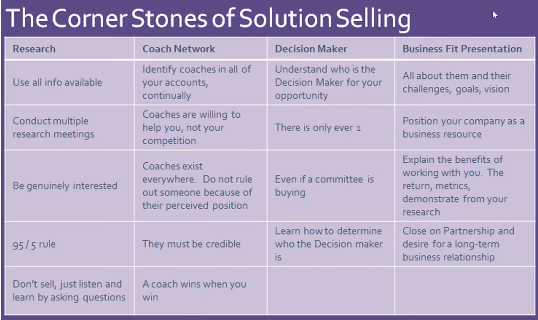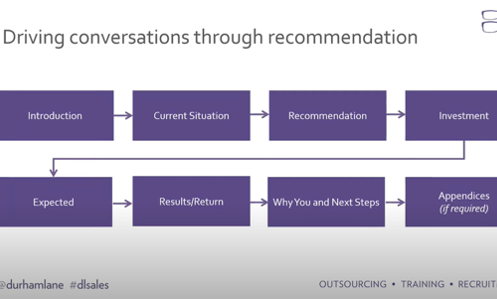THE IMPORTANCE OF SALES TRILOGY IN PARTNERSHIP WITH DURHAMLANE - HOW TO RUN AN EFFECTIVE MEETING |
Part Two of the durhamlane trilogy of webinars to highlight the importance of selling, especially in the ever changing, increasingly virtual world we now live in. This webinar led by Luke Robinson focuses on the importance of preparation and mastering technology. |
Speakers |
Kerry Hallard CEO of GSA | Luke Robinson Sales Performance Consultant at Durhamlane |
Durhamlane is a sales performance organisation, operating at the front end of sales for their customers, creating opportunities on their behalf. They recognised quite early on in the pandemic that it is important to continue to sell through changing times, to keep business fit and business value, continue the already established relationships as well as develop new ones. |
Selling at a Higher Level – our Proven Methodology The durhamlane pre meeting planner earns its stripes in the ‘Define and Understand’ section of the Selling at a Higher-Level Methodology, covered in part 1 of the trilogy. Luke explains it’s important to understand how a company buys as an average 10.2 people involved in a buyer decision. The GROW pre-meeting planner is designed to encourage focus, establish what needs to come out of the meeting and what is the way forward. |
Cornerstones of Solution Selling The first step is to think about how your customer perceives you. You want to become a strategic resource for your client, so think like one from day 1. Identify the key strategic decision maker. Amazing things start to happen when you engage at a higher level, and you will achieve more business and consultancy-based conversations. Lots of salespeople have the mindset of being a vendor and a problem solver, if you engage and understand the business, you can create value proposals. The Cornerstones of Solution Selling are broken down into 4 key areas. |
|
GROW Pre-meeting Planner Goals – objectives of the meeting – what do we want to get out of the meeting? Helpful to have an overall goal and then develop micro goals Reality (of today) – What do we know about the customer? How can we find out what we need to know? Opportunities – what might be possible? Where does the opportunity lie in this business? Way Forward – Developing a plan – make sure the meeting has a beginning, middle and end. Develop a joint vision, who needs to be involved and what do we need from both parties? A Thoughtful Response |
|
Click here to access the Pre-Meeting Planner document - How to plan an effective meeting by durhamlane |
‘How to run an effective meeting’ takeaways
“Luck is when preparation meets opportunity” |
Q&A From the Floor |
Virtual meetings are different to face to face, prep isn’t done as much as it was. What would you say is the optimum time for a meeting? And what is your experience in keeping everyone engaged? Luke advises an ideal length is 30, 45 or 60 minutes maximum. If the time is there you can spend a lot of your time just filling the time. If you’re meeting people for the first time its good to set ground rules at the beginning of the meeting e.g everyone having their cameras on, encouraging everyone to be off mute to keep the conversation open. Make sure everyone is engaged and interacts with the meeting. |
What is the best ice breaker you’ve seen to keep everyone engaged from the start? People tend not to like ice breakers; some people may not want to come forward. Find some commn ground and start a conversation, ask what their day is looking like, are they currently working from home? |
We have been historically struggled in hiring good salespeople. How do you spot a good salesperson? What are the top 3 traits you would say we should look for? We are in the professional services industry. Salespeople are different individuals, and there isn’t one type fits all. It’s all around how much they want it and how much ambition they have. You want them to be able to sell themselves, but not over sell themselves. Do they spend time trying to get to know your world as well as you getting to know them? |
How do you guarantee success with outsourcing salespeople? Typically, people will go with a provider who pays per lead. At Durhamlane, they believe this breeds the wrong type of behaviour and may lack a qualification process. It’s important to qualify as well as disqualify leads. Understand how they reward their staff and understand the training and coaching they have. |
Any hints or tips for best taking the customer on a virtual journey? The best way to do it is to share screen, people need to see you in action. You can get more of an understanding of their understanding this way, to create excitement. |
Do you have any tips for selling services (IT services precisely), it is really challenging especially during COVID-19 pandemic and C-suit people are not even willing to just have a discovery meeting often, do you have any tips on that? It’s all about understanding the client’s urgency. Always looking for compelling events as salespeople, which will drive someone to change and create a need. The best salespeople can create a need when there isn’t one in the first place, uncovering a problem they didn’t even know they had. Kerry adds that we are seeing a move towards digital transformation – there is a huge demand for growth in the buyers of IT services. The opportunities out there are strong. |

